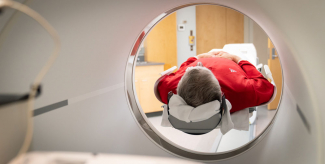
Sterling Johnson, PhD, Barbara Bendlin, PhD, and Brad Christian, PhD, were interviewed in the Wisconsin State Journal as part of a 3-day investigative series titled “Fading away: Wisconsin’s dementia crisis.” The article included updates on how Wisconsin ADRC researchers use brain imaging and fecal samples to help answer questions about brain disease progression.
Dr. Johnson and Dr. Christian use brain imaging scans to pinpoint signs of Alzheimer’s disease, sometimes many years before symptoms develop. While most dementia research focuses on the brain, a new study at the Wisconsin ADRC is also looking elsewhere: in feces. In a study analyzing stool samples from 50 people, half of whom had Alzheimer’s disease, Dr. Bendlin’s research lab found people with the disease had fewer kinds of gut bacteria. The findings support growing evidence of a link between brain health and gut bacteria.
Read more about ongoing Wisconsin ADRC research studies in the article "UW Madison brain scan studies seek to pinpoint signs of Alzheimer’s disease" from the November 26, 2019, Wisconsin State Journal.
- Log in to post comments



